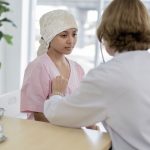What is an inguinal hernia?
Your abdominal cavity contains your intestines and other structures. These are protected by your abdominal wall, which is made up of four layers. Weak spots can develop in the layer of muscle, resulting in the contents of your abdomen, along with the inner layer, pushing through your abdominal wall. This produces a lump called a hernia.
An inguinal hernia happens at the inguinal canal. This is a narrow passage through your abdominal wall.
-a00299.png)
What are the benefits of surgery?
You should no longer have the hernia. Surgery should prevent the serious complications that a hernia can cause and allow you to return to normal activities.
Are there any alternatives to surgery?
You can sometimes control the hernia with a truss (padded support belt) or simply leave it alone. It will not get better without surgery.
What will happen if I decide not to have the operation or the operation is delayed?
Occasionally, the hernia can get larger with time. It can also be dangerous because your intestines or other structures within your abdomen can get trapped and have their blood supply cut off (strangulated hernia). The symptoms that may suggest a strangulated hernia are:
- severe pain
- a hernia that will not disappear when you lie down
- vomiting
If you have any of these symptoms you must call your healthcare team immediately as you may need an urgent operation.
What does the operation involve?
The operation is performed under a general anaesthetic and usually takes about 30 minutes (less than an hour for a repair to both sides).
Your surgeon will make a small cut on or near your belly button so they can insert an instrument in your abdominal cavity to inflate it with gas (carbon dioxide). They will make two small cuts on your abdomen so they can insert tubes (ports) into your abdomen. Your surgeon will insert surgical instruments through the ports along with a telescope so they can see inside your abdomen and perform the operation.
Your surgeon will return the part of your abdomen that is causing the hernia, and insert a synthetic mesh to cover the weak spot.
How can I prepare myself for the operation?
If you smoke, stopping smoking now may reduce your risk of developing complications and will improve your long-term health.
Try to maintain a healthy weight. You have a higher risk of developing complications if you are overweight.
Regular exercise should help to prepare you for the operation, help you to recover and improve your long-term health. Do not do exercises that involve heavy lifting or make your hernia painful. Before you start exercising, ask the healthcare team or your GP for advice.
Speak to the healthcare team about any vaccinations you might need to reduce your risk of serious illness while you recover. When you come into hospital, practise hand washing and wear a face covering when asked.
What complications can happen?
Some complications can be serious and can even cause death.
General complications of any operation
- bleeding
- allergic reaction to the equipment, materials or medication
- infection of the surgical site (wound)
- blood clot in your leg
- blood clot in your lung
- chest infection
Specific complications of this operation
Keyhole surgery complications
- surgical emphysema
- injury to your bowel
- gas embolism
Hernia repair complications
- developing a collection of blood (haematoma) or fluid (seroma) at the site of the original hernia
- continued discomfort or pain in your groin
- for men, discomfort or pain in your testicle on the side of the operation
- for men, difficulty passing urine
- for men, damage to the blood supply of your testicle
Consequences of this procedure
- pain
- unsightly scarring of your skin
How soon will I recover?
You should be able to go home the same day or the day after.
You may return to normal activities when you feel comfortable to do so, usually after a week.
Do not play sports or do strenuous exercise for 6 weeks.
Regular exercise should help you to return to normal activities as soon as possible. Before you start exercising, ask the healthcare team or your GP for advice.
Most people make a full recovery and can return to normal activities.



